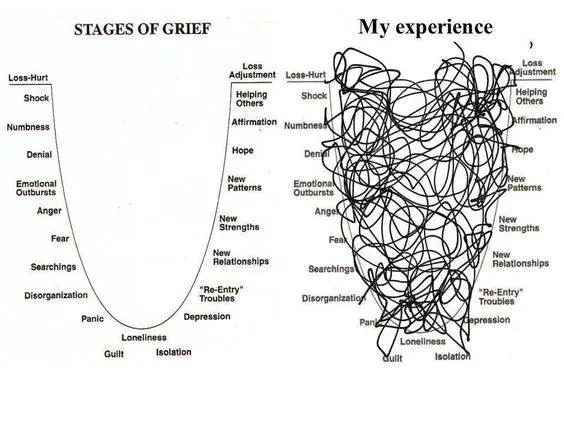What are the 5 Stages of Grief?
The 5 Stages of Grief is the title of a theory developed by Swiss psychiatrist, Elisabeth Kübler-Ross, to support her clients who had learned that they had a terminal illness. The model hypothesises 5 emotional states that terminally ill patients were likely to progress through after being informed of their diagnoses. The 5 common experiences being: denial, anger, bargaining, depression and acceptance.
This model known as the 5 Stages of Grief was originally designed as a reflection of how people cope with dying and illness, yet has developed into an inaccurate definition of grief. Kübler-Ross did not see this theory as a reflection of how people grieve, as grief is not a predictable progression of stages. It is unsystematic with a jumbled range of emotions and reactions.
While each person’s experience with grief can be unique, as identified in our discussion with Grief Councillor Ruth Walker in our article Grief and Loss, the 5 Stages of Grief model can be a helpful scaffold for discussion and reflection. Indeed, as demonstrated by the chart below, grief can take a ‘messy’ path, so it’s important not to set any expectation, rather recognise where you (or a friend) is at and help them wherever they are.

Image source: https://mediocremeanderings.com/2018/05/02/grief/
There are certainly strong emotions that can be experienced throughout a time of grief. If you are having a difficult time identifying what you are experiencing or want to show empathy to a friend we have delved into some of the common emotions to assist.
1) Denial
Denial is a very common reaction to loss. On a subconscious level, people might enter denial to avoid feelings of sadness and emotional turmoil. Giving yourself the time and space to acknowledge, access and even express your feelings are all self-care strategies that can support you through denial.
2) Anger
It is not unusual for the bereaved to direct anger toward the deceased for leaving them behind, and causing distress. In some circumstances people become angry at themselves and feel they should have done more to stop the loss from occurring.
3) Bargaining
When coping with grief, people sometimes engage in a form of bargaining. Generally, this negotiation is with God, or the universe, and promises are made in exchange for the pain to be taken away.
4) Depression
According to the experts at Beyond Blue, although grief and depression can appear similar, they are quite different. Both can lead to feelings of intense sadness, insomnia, poor appetite and weight loss. The difference is that depression can become persistent and overshadow all areas of life.
5) Acceptance
With acceptance, recovery begins to become more about the bereaved person, and less about the deceased. Upon experiencing acceptance, the bereaved might be able to start to envisage a new phase of life, without their loved one.
6) Guilt
It is normal to have feelings of guilt and regret. “I should have done more” are words that can trouble many people. Usually, it is not difficult to find reasons for guilt and it is natural to consider ways that we could have acted differently. However, use the lessons within guilt to apply to areas in your life that you can use for the better, either in relationships, activities or starting new traditions.
7) Numbness
The roller coaster of emotions highlighted above can also be skipped by some who may report feeling nothing at all. When death is either sudden or expected some people can experience shock that can lead to feeling emotionally numb. Things do not follow the high and low motions of everyday life, feelings and reactions are muted and neither great sadness or happiness is experienced for a time. Feeling nothing when you’re expecting to feel intense sadness can be disorienting. To help bring on feelings again there are ways to try to coax your emotions back out. One way to do this is by talking to friends, family, or a mental health professional.
The Pastoral Care team at Bethel Funerals has supported hundreds of bereaved families and we know that the experience of grief is unique to the individual. Although grief is a natural process, it is emotionally challenging and that is why self-care is of paramount importance when grieving a loved one.
What is self-care?
It is essential that you take care of yourself, even as you deal with grief. When coping with grief many people become busy looking after others and consequently neglect to address grief symptoms in themselves. We have created 5 helpful tips with a focus on self-care, in hope that you will begin to heal.
Tip 1: Use journaling to help you move through emotions
If you don’t feel able to verbally express yourself to a trusted companion, or a health professional, the private acts of prayer and journaling can also help you move through your emotions. You might like to consider keeping a grief journal to record your reflections as you deal with grief. Try to suspend self-judgement, be kind to yourself and allow your feelings of grief to be honoured, not denied.
Tip 2: Use exercise to combat negative emotions
Exercise is an excellent self-care antidote to any negative emotions that may arise. Channelling the negative energy into a positive pursuit like walking, jogging or gentle exercise classes has the added benefit of boosting the brain’s feel-good endorphins, enhancing your sense of inner calm, and supporting your general wellbeing. Consult your GP for a recommendation on the form of exercise best suited to your needs.
Tip 3: Join local groups to re-engage with people
To counter the feelings of loneliness you might like to consider joining a local support group for the bereaved. This is a self-care activity that may help you to re-engage with the community; making connections with like-minded people can be a source of comfort and strength. The Australian Centre for Grief and Bereavement can provide information regarding bereavement support groups in your local area.
Tip 4: Take in the little joys
If feeling depressed, try to slow down and mindfully observe the small delights around you. Do things you enjoy, even if you don’t feel like doing them.
Meditation can be a supportive self-care activity to help counter grief-related depression. If you would like to try meditation, the Smiling Mind website provides free meditations for adults and children.
If depression symptoms continue, or your grief begins to get in the way of how you live, work or share relationships it is important to seek professional help. You might like to refer to the grief and loss pages of the Beyond Blue website for further information.
Tip 5: Find strength in prayer
Moving forward without a loved one can be daunting. If you have a faith, you might find comfort in prayer. Talking with your minister, or faith leader, is a self-care activity that can lend you strength and focus as you reconfigure a future and find your own way forward.
Thoughtful planning amidst grief
Navigating funeral arrangements during this challenging time can feel overwhelming, but funeral directors are there to offer guidance and support. Considering options like pre paid funerals can ease stress for loved ones by taking care of arrangements in advance.
Choosing the right casket, whether traditional or something unique like a wicker coffin, is a deeply personal decision that reflects the individuality of the departed. These choices can bring comfort and peace during times of grief.
Grief is a natural response to loss. Our Pastoral Care team know that adjusting to your loss takes time and we are here to guide you through this journey. The Grief Care pages of our website have been created as a resource to support you as you deal with grief.
